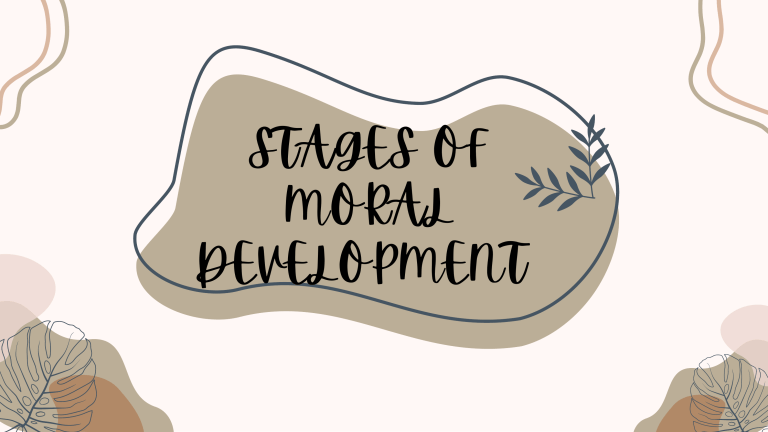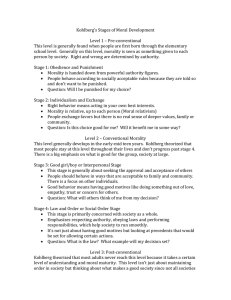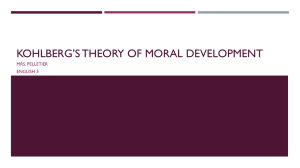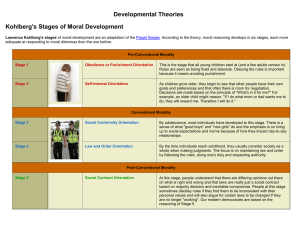
STAGES OF MORAL DEVELOPMENT Moral development is a complex psychological process that explores how individuals form their understanding of right and wrong, ethical decisionmaking, and their sense of justice. One prominent theory in this field is Lawrence Kohlberg's Stages of Moral Development. Kohlberg, building upon Jean Piaget's cognitive development theory, proposed a six-stage model that outlines the progression of moral reasoning from childhood to adulthood. THEORY OF MORAL DEVELOPMENT The theory of moral development, primarily developed by psychologist Lawrence Kohlberg, suggests that individuals progress through distinct stages of moral reasoning as they mature. Kohlberg proposed three main levels, each containing two stages: pre-conventional, conventional, and post-conventional morality. The theory focuses on how individuals think about right and wrong and how their moral reasoning evolves over time. 3 LEVELS OF MORAL DEVELOPMENT 1.PRECONVENTIONAL MORALITY 2.CONVENTIONAL MORALITY 3.POST-CONVENTIONALL MORALITY 1. Preconventional (you scratch my back and I will scratch yours) 2. Conventional (conforming to other's expectations, regardless of immediate consequences) 3. Post-conventional (determine moral values apart from groups holding them) The six stages of moral development were originally proposed by Lawrence Kohlberg, an American psychologist, in his theory of moral development. Kohlberg's theory, which builds on the earlier work of Jean Piaget, suggests that individuals progress through a series of stages in their moral reasoning as they age and mature. Here are the six stages of moral development: 1(PRECONVENTIONAL) 2(CONVENTIONAL) 3(POST-CONVENTIONAL) OBEDIENCE AND PUNISHMENT stage 1 INDIVIDUALISM AND EXHANGE stage 2 INTERPERSONAL RELATIONSHIP[ stage 3 MAINTAINING SOCIAL ORDER stage 4 SOCIAL CONTRACT & INDIVIDUAL RIGHTS stage 5 UNIVERSAL PRINCIPLES stage 6 PRECONVENTIONAL LEVEL: Stage 1 - Obedience and Punishment Orientation: At this stage, individuals focus on avoiding punishment. They obey rules to avoid being physically punished. Stage 2 - Individualism and Exchange: In this stage, individuals begin to recognize that there is more than one perspective. They learn that different people have different needs and interests and may make deals to satisfy those needs. CONVENTIONAL LEVEL: Stage 3 - Interpersonal Relationships: Individuals at this stage are concerned with interpersonal relationships and the approval of others. They want to be seen as a good person and seek approval from those around them. Stage 4 - Maintaining Social Order: This stage involves an understanding of societal rules and the importance of maintaining social order. Individuals at this stage believe in obeying laws and fulfilling duties to maintain a functional society. POST-CONVENTIONAL LEVEL: Stage 5 - Social Contract and Individual Rights: At this stage, individuals recognize the importance of social contracts and the need for a legal system that serves the greater good. They understand that laws can be changed for the benefit of society. Stage 6 - Universal Principles: The highest stage of moral development involves a commitment to universal ethical principles. Individuals at this stage develop their moral code based on abstract principles of justice, equality, and human dignity. They may act according to their principles even if it means breaking the law. "Morality is not just a system for determining what is right or wrong; it's a guide for living a good life." - Atul Gawande PRESENTED BY : TUAGNON, ZYRAH ROSALES,PAULEEN





